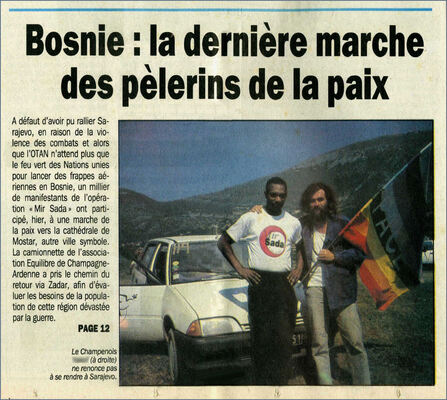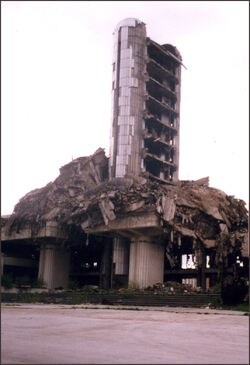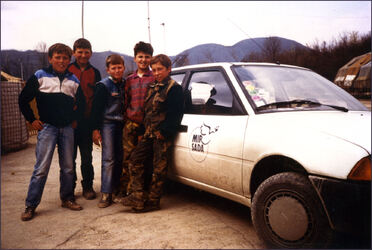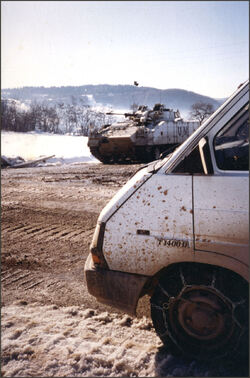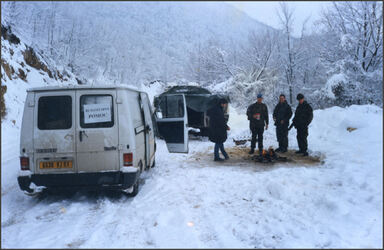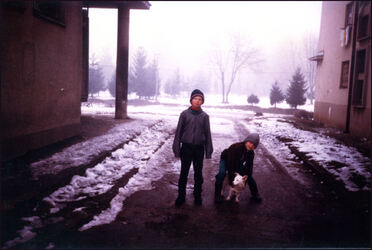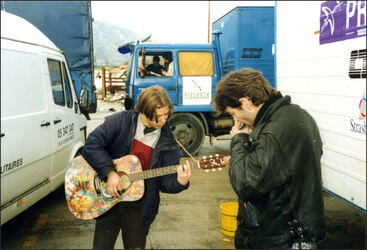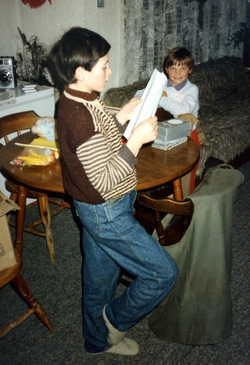OPEN THE DOORS !
Israel must end the Gaza blockade, end all killings, and enable Gaza to open to the world, so as to guarantee the possibility of a viable economy, and improve the humanitarian situation.
The Palestinians must end all attacks against Israel and the Israelis.
Human beings are not bargaining chips.
Accordingly :
The Israelis, who hold some six thousand Palestinian prisoners in their jails, must urgently release a significant group of women prisoners, sick persons, the youngest and longest-serving among them, along with those held under administrative detention and other arbitrary procedures – including all the elected members of the Palestinian legislature.*
* Additional information: In exchange for the liberation of Gilad Shalit, 1,027 prisoners were released in 2011, including most of the women detained then, and 78 of the 104 among the longest-serving prisoners were released in 2013, leaving the last scheduled group of 26 behind bars.
Since the attacks known as ‘the Facebook Intifada’ there has been a surge in the number of prisoners, from around 5,000 to some 6,000.
When this Campaign started in the spring of 2008, the number of prisoners was close to 9,000. As the situation in blockaded Gaza has only worsened in time, the decision was taken in Brussels, in July 2014, to keep the original wording of the Campaign, as conceived in 2008 after the Gaza-Egypt Border Breach. It became evident in the winter of 2015-2016 that the wording of the second sentence had to be changed, the word “rocket” had to be removed, to include all forms of attacks by Palestinians against Israelis. The processing to all the signatories is ongoing. Most of the signatories gave their support between 2008 and 2014.
In 2019, the elections brought the number of signatories among the MEPs down from 239 to 104.
As of October, 20 2019, we are in a suspending process : what used to be a binary matter ‘Israel vs. the Palestinians’ has become a much more complex equation in the course of time. Also, the long psychodrama of the Brexit is keeping us all on the edge, as far as the European Union is concerned.
58 Nobel Laureates (+21 deceased since 2010)
12 Peace Nobel Laureates: Bishop Carlos Belo, President Jimmy Carter, the Dalaï Lama, Shirin Ebadi, Leymah Gbowee, John Hume, Mairead Maguire, Adolfo Pérez Esquivel, Archbishop Desmond Tutu, Cora Weiss (UN Representative for ICP), Betty Williams, Jody Williams
18 Chemistry Nobel Laureates : Peter Agre, Paul Berg, Thomas Cech, Martin Chalfie, Elias Corey, Paul Crutzen, Robert Curl, Johann Deisenhofer, Richard Ernst, Gerhard Ertl, Alan Heeger, Dudley Herschbach, Roald Hoffmann, Robert Huber, Yuan T. Lee, Jean-Marie Lehn, John Polanyi, John Walker; John Fenn (deceased 2010), Sir Harold Kroto (deceased in 2016), Herbert Hauptman (deceased, 2011), William Lipscomb (deceased, 2011), Jens Skou (deceased 2018), Sir Aaron Klug (deceased 2018), Manfred Eigen (deceased 2019).
12 Medicine Nobel Laureates : Mario Capecchi, Martin Evans, Edmond Fischer, Roger Guillemin, Louis Ignarro, Eric Kandel, Erwin Neher, Sir Paul Nurse, Richard Roberts, Jack Szostak, Torsten Wiesel, Harald zur Hausen; Baruj Benacerraf (deceased 2010), Marshall Nirenberg (deceased 2010), Baruch Blumberg (deceased, 2011), E. Donnall Thomas (deceased 2012), Christian de Duve (deceased 2013), François Jacob (deceased 2013); Günter Blobel (deceased 2018), Arvid Carlsson (deceased 2018), Paul Greengard (deceased 2019).
9 Physics Nobel Laureates : Albert Fert, John Hall, Brian Josephson, Tony Leggett, Douglas Osheroff, Jack Steinberger, Gerardus ‘t Hooft, Daniel Tsui, Martinus Veltman; Donald Glaser (deceased 2013),Leon Lederman (deceased 2018), Zhores Alferov (deceased 2019).
4 Literature Nobel Laureates : John Coetzee, Elfriede Jelinek, Toni Morrison, Wole Soyinka; Dario Fo (deceased 2016)
3 Economics Nobel Laureate : George Akerlof, Daniel Kahneman, Oliver Williamson; Sir James Mirrlees (deceased 2018).
101 Members of European Parliament (+ 547 Former Members of the EP since 2008) (in grey the MEPs who left in 2019)
Italy: Brando Benifei, Fabio Massimo Castaldo, Ignazio Corrao, Andrea Cozzolino, Rosa D’Amato, Paolo De Castro, Eleonora Evi, Laura Ferrara, Piernicola Pedicini, Patrizia Toia, Marco Zullo
Marco Affronte, Daniela Aiuto, Laura Agea, Tiziana Beghin, Renata Briano, Sergio Cofferati, Silvia Costa, Lorenzo Fontana, Michela Giuffrida, Roberto Gualtieri, Giulia Moi, Pier Antonio Panzeri, Massimo Paolucci, Elly Schlein, Renato Soru, Barbara Spinelli, Dario Tamburrano, Marco Valli, Marco Zanni
France : Karima Delli, Pascal Durand, Sylvie Guillaume (Vice-President of the EP), Brice Hortefeux, Yannick Jadot, Younous Omarjee, Dominique Riquet, Michele Rivasi, Robert Rochefort,
Eric Andrieu, Guillaume Balas, José Bové, Alain Cadec (Chair, Fisheries), Michel Dantin, Jean-Paul Denanot, Nathalie Griesbeck, Françoise Grossetête, Eva Joly, Patricia Lalonde, Alain Lamassoure, Jérôme Lavrilleux, Patrick Le Hyaric, Edouard Martin, Elisabeth Morin-Chartier, Gilles Pargneaux, Vincent Peillon, Maurice Ponga, Christine Revault d’Allonnes Bonnefoy, Saïfi, Isabelle Thomas, Marie-Christine Vergiat
Germany : Klaus Buchner, Reinhard Hans Bütikofer, Christian Ehler, Cornelia Ernst, Evelyne Gebhardt, Sven Giegold, Ska Keller, Martina Michels, Norbert Neuser
Jan Albrecht, Michael Cramer, Thomas Händel (Chair, Employment and Social Affairs), Rebecca Harms (Co-President, Greens-EFA), Maria Heubuch, Jo Leinen, Barbara Lochbihler (Vice-Chair, Human Rights), Sabine Lösing, Gesine Meissner, Helmut Scholz, Renate Sommer, Kerstin Westphal, Joachim Zeller, Gabriele Zimmer (Chair GUE/NGL)
Poland : Jerzy Buzek (former President of the EP), Ryszard Czarnecki (Vice-President of the EP), Krzysztof Hetman, Danuta Hübner (Chair, Constitutional Affairs), Jarosław Kalinowski, Bogusław Liberadzki (Quaestor), Elżbieta Łukacijewska, Jan Olbrycht, Róza Gräfin von Thun und Hohenstein,
Lidia Geringer de Oedenberg, Adam Gierek, Danuta Jazłowiecka, Jarosław Wałęsa, Bogdan Brunon Wenta, Janusz Wladyslaw Zemke, Tadeusz Zwiefka
UK : Martina Anderson, Catherine Bearder (Quaestor), Jill Evans, Claude Moraes, Molly Scott Cato, Alyn Smith, , Julie Ward
Julie Girling, Mary Honeyball, Ian Hudghton, Sajjad Karim, Wajid Khan, Jean Lambert, Linda McAvan, David Martin, Catherine Stihler, Keith Taylor, Derek Vaughan
Spain : Izaskun Bilbao Barandica, Iratxe García Pérez, Eider Gardiazabal Rubial, Javier Nart, Maite Pagazaurtundúa Ruiz, Ernest Urtasun
Ines Ayala Sender, Santiago Fisas Ayxelà, Florent Marcellesi, Josep-Maria Terricabras, Ramon Tremosa i Balcells
Belgium : Pascal Arimont, Philippe Lamberts, Marc Tarabella, Kathleen Van Brempt, Guy Verhofstadt (Chair, Liberals; former Prime Minister)
Mark Demesmaeker, Gérard Deprez, Louis Michel, Claude Rolin, Bart Staes
Romania : Cristian-Silviu Buşoi, Marian-Jean Marinescu, Renate Weber, Iuliu Winkler
Victor Boştinaru, Monica Luisa Macovei, Csaba Sógor, Theodor Stolojan, Claudiu Ciprian Tănăsescu, Traian Ungureanu, , Maria Gabriela Zoana
Ireland : Matt Carthy, Luke “Ming” Flanagan, Mairead McGuinness (Vice-President of the EP)
Lynn Boylan, Nessa Childers, Brian Crowley, Marian Harkin, Brian Hayes, Liadh Ní Riada
Slovenia : Franc Bogović, Tanja Fajon, Milan Zver
Alojz Peterle, Patricia Sulin, Ivo Vajgl
Malta : Miriam Dalli, Roberta Metsola, Alfred Sant
Marlene Mizzi, Francis Zammit Dimech
Greece : Dimitrios Papadimoulis (Vice-President of the EP), Maria Spyraki, Elissavet Vozemberg
Miltiadis Kyrkos
Portugal : Marisa Matias, Carlos Zorrinho
José Inácio Faria, Antonio Marinho e Pinto, Sofia Ribeiro
Netherlands : Bas Eickhout, Esther de Lange
Wim van de Camp, Dennis de Jong, Anne-Marie Mineur, Lambert van Nistelrooij, Judith Sargentini, Wim van de Camp
Luxembourg : Charles Goerens
Georges Bach, Frank Engel, Claude Turmes
Slovakia : Monika Flašíková Benová
Eduard Kukan, Vladimír Maňka, Miroslav Mikolášik, Monika Smolkova, Boris Zala
Austria : Othmar Karas (former Vice-President of the EP), Evelyn Regner
Heinz Becker, Karin Kadenbach, Josef Weidenholzer
Lithuania : Vilija Blinkevičiūtė, Viktor Uspaskich
Zigmantas Balčytis, Paksas, Algirdas Saudargas
Hungary : Livia Jaroka (Vice-President of the EP); Ádám Kósa
Benedek Jávor, Laszlo Tökés (former Vice President of the EP)
Denmark : Margrete Auken, Christel Schaldemose
Ole Christensen
Finland : Heidi Hautala, Sirpa Pietikaïnen
Liisa Jaakonsaari
Sweden : Malin Björk
Anna Hedh, Olle Ludvigsson, Jens Nilsson, Soraya Post, Marita Ulvskog
Bulgaria : Andrey Kovatchev (Quaestor)
Svetoslav Hristov Malinov
Latvia : Sandra Kalniete
Krišjānis Kariņš
Croatia : Ruža Tomašić
Davor Škrlec
Cyprus :
Takis Hadjigeorgiou, Demetris Papadakis, Neoklis Sylikiotis, Eleni Theocharous
Czech Republic :
Jirí Maštálka (former Quaestor), Pavel Poc
Estonia :
Indrek Tarand
Others
Yasmina Khadra, Noam Chomsky, Jean-Luc Godard, David Grossman, Satish Kumar, John Mayall, Hanna Siniora, Martin Gray (Warsaw Ghetto survivor, deceased 2016), Stéphane Hessel (observer of the editing of the Universal Declaration of Human Rights of 1948; deceased, 2013), Franca Rame (deceased 2013), Michel Rocard (former French Prime Minister; deceased 2016), Amos Oz (deceased 2019).
October 27, 2019
















